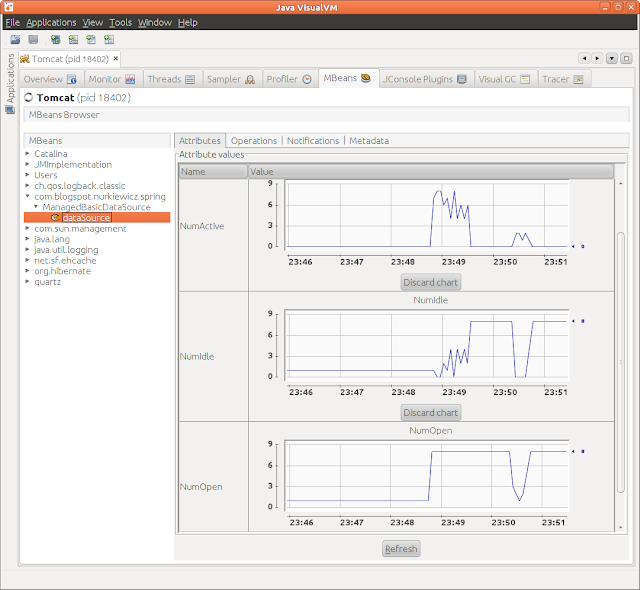Enabling JMX in Hibernate, Ehcache, Quartz, DBPC and Spring
Join the DZone community and get the full member experience.
Join For FreeA collection of short how-to's for enabling JMX in several popular Java technologies.
Continuing our journey with JMX (see: ...JMX for human beings)
we will learn how to enable JMX support (typically statistics and
monitoring capabilities) in some popular frameworks. Most of this
information can be found on project's home pages, but I decided to
collect it with few the addition of some useful tips.
Hibernate (with Spring support)
Exposing Hibernate statistics with JMX is pretty simple, however some nasty workarounds are requires when JPA API is used to obtain underlying SessionFactoryOne more thing has left. Obviously we have to use our custom subclass instead of org.springframework.orm.jpa.LocalContainerEntityManagerFactoryBean. Also, in order to collect the actual statistics instead of just seeing zeroes all the way down we must set the hibernate.generate_statistics flag.
In addition we get a nice Hibernate logging:
EhCache
Monitoring caches is very important, especially in application where you expect values to generally be present there. I tend to query the database as often as needed to avoid unnecessary method arguments or local caching. Everything to make code as simple as possible. However this approach only works when caching on the database layer works correctly. Similar to Hibernate, enabling JMX monitoring in EhCache is a two-step process. First you need to expose provided MBean in MBeanServer:
As we can see the percentage of cache misses increases. Never a good thing. If we don't enable cache statistics, enabling JMX is still a good idea since we get a lot of management operations for free, including flushing and clearing caches (useful during debugging and testing).
Quartz scheduler
In my humble opinion Quartz scheduler is very underestimated library, but I will write an article about it on its own. This time we will only learn how to monitor it via JMX. Fortunately it's as simple as adding:Apache Commons DBCP
Apache Commons DBCP is the most reasonable JDBC pooling library I came across. There is also c3p0, but it doesn't seem like it's actively developed any more. Tomcat JDBC Connection Pool looked promising, but since it's bundled in Tomcat, your JDBC drivers can no longer be packaged in WAR.The only problem with DBCP is that it does not support JMX. At all (see this two and a half year old issue). Fortunately this can be easily worked around. Besides we will learn how to use Spring built-in JMX support.
Looks like the standard BasicDataSource has all what we need, all we have to do is to expose existing metrics via JMX. With Spring it is dead-simple – just subclass BasicDataSource and add @ManagedAttribute annotation over desired attributes:

JMX support in the Spring framework itself is pretty simple. As you have seen above exposing arbitrary attribute or operation is just a matter of adding an annotation. You only have to remember about enabling JMX support using either XML or Java (also see: SPR-8943 : Annotation equivalent to <context:mbean-export/> with @Configuration):
From http://nurkiewicz.blogspot.com/2011/12/enabling-jmx-in-hibernate-ehcache-qurtz.html
Opinions expressed by DZone contributors are their own.


Comments